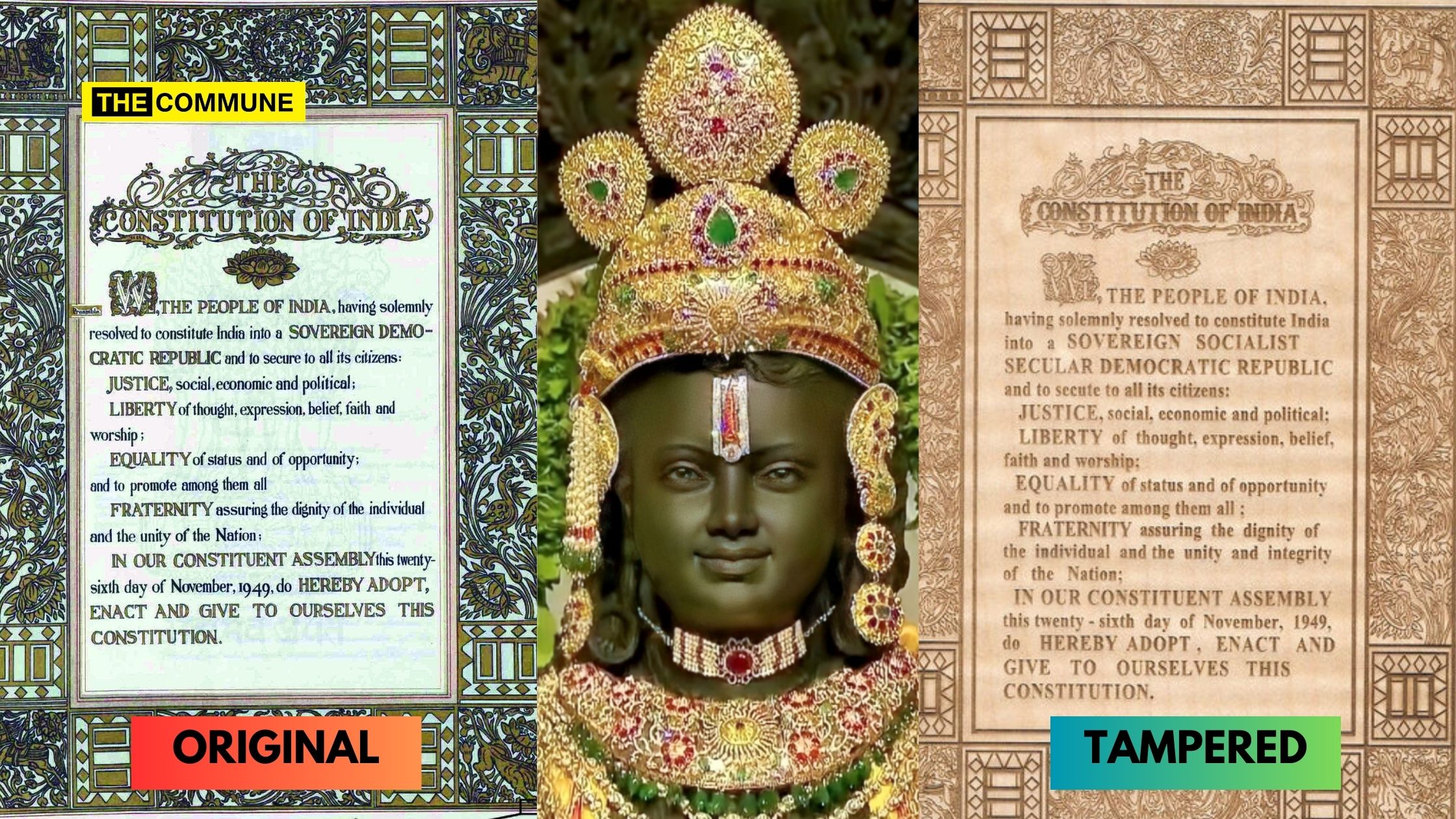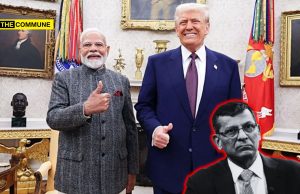
Peddling narratives is a familiar practice for The News Minute (TNM) and their ilk. This time, it not only opened Pandora’s box of the famous preamble but also highlighted Malayalam film stars in the industry who shared images of the preamble of the constitution. This happened on 22 January 2024 the day when the nation was preoccupied with celebrating Pran Prathishta and sharing images of the child Ram across the internet.
TNM declared that this action serves as a recall on the day when the Bharatiya Janata Party appears to have delivered on one of its prominent Hindutva pledges, juxtaposed against the foundational principles of secularism, socialism, and democracy embedded in the Constitution.
The edited version of the Preamble of the Constitution proclaims:
“WE, THE PEOPLE OF INDIA, having solemnly resolved to constitute India into a SOVEREIGN SOCIALIST SECULAR DEMOCRATIC REPUBLIC and to secure to all its citizens:
JUSTICE, social, economic and political;
LIBERTY of thought, expression, belief, faith and worship;
EQUALITY of status and of opportunity and to promote among them all;
FRATERNITY assuring the dignity of the individual and the unity and integrity of the Nation;
IN OUR CONSTITUENT ASSEMBLY this twenty-sixth day of November, 1949 do HEREBY ADOPT, ENACT AND GIVE TO OURSELVES THIS CONSTITUTION.”
The Constituent Assembly extensively deliberated on the Preamble of the Constitution on 17 October 1949. The discussions revolved around crucial topics such as the name of India and the potential inclusion of elements like God, Gandhi, and the Union of Indian Socialistic Republics. Despite numerous proposed amendments by members, these suggestions were either withdrawn or rejected. Ultimately, the Constituent Assembly decided to adopt the Preamble in the form presented to the Drafting Committee. It’s important to note that the concepts of Socialist, Secular, Unity and Integrity of the Nation were introduced during the dark days of the emergency era of Indira Gandhi through the 42nd Constitutional Amendment Act of 1976.
In a discussion during the Constituent Assembly, Prof. K. T. Shah proposed an amendment to include the term “socialist” in the Preamble of the Constitution. He expressed that socialism, as implied by the amendment, aimed at ensuring equal justice, equal opportunity, and contributions from every individual to their maximum capacity, with an assurance of meeting everyone’s needs for a decent civilized existence. He emphasized that this could be achieved without resorting to violent revolutions. Prof. Shah argued that socialism, as the only just order, would eliminate class privileges and restore natural rights. He saw no objection to describing the Union as a “Socialist Union of States.”
Dr. B. R. Ambedkar opposed the amendment, asserting that the Constitution is a mechanism for regulating state organs, not for prescribing a particular social organization. He argued against fixing a specific social form in the Constitution, as it would impede the people’s liberty to decide their societal structure based on changing circumstances. Ambedkar also pointed out that socialist principles were already incorporated in the directive principles of state policy outlined in the Constitution. He considered Prof. Shah’s amendment superfluous.
When discussing the concept of secularism, the understanding varies across different regions. In the United States, secularism entails the coexistence of the state and the church within the same human society without direct involvement with each other. In Europe, secularism has evolved as the rejection of all things religious, particularly in the realm of political functioning. Conversely, in India, secularism takes on a different meaning, emphasizing equal respect for all religions. In the Indian context, a ‘secular state’ safeguards all religions impartially and does not endorse any specific religion as the state’s official religion.
The question arises: Is India genuinely secular? If we examine the fundamental tenets of secularism as understood in the West, it implies that the state should not be intertwined with religion, and there should be no discrimination among citizens based on their religion or mode of worship, ensuring equality before the law for everyone. However, in India, this strict interpretation of secularism is challenged by the existence of distinct sets of laws for different communities. For example, the Muslim community has the Waqf Board overseeing their religious properties, while Hindu temples are administered by the respective state governments. Additionally, concessions granted to specific communities based on religion seem to contradict the theory of secularism, potentially fostering increased majority communalism despite Article 44 urging the state to establish a uniform civil code.
In the ceremony for the inauguration of the Ram Temple in India today, the government was not involved in any financial matters such as investment or collection, aligning with secular principles. The event encouraged participation from all members, irrespective of their religious beliefs, caste, gender, or political affiliations.
Is it inappropriate for the Prime Minister or President of India to participate in a temple ceremony? Does such participation convey an endorsement of only Hindu Dharma?
Representing the diverse spirit of the new India, people from various walks of life, including Christian community and Sikhs like Harbhajan Singh, actively participated in the ‘Pran Pratishtha’ ceremony, highlighting the nation’s collective commitment to humanity. Dr. Imam Umer Ahmed Ilyasi, Chief Imam of the All India Imam Organization, emphasized the overarching importance of humanity and the nation, stating, “For us, the nation is first.”
The primary contributors to the Ram Temple were individuals from across the country who generously donated to the temple organization. Therefore, it is unfounded to use the preamble as a basis for criticizing the temple’s inauguration.
In reaction to the festivities, the actions taken by the political coalition I.N.D.I, such as the revocation of the Sanadhana and the refusal of invitations, emphasizing minority appeasement, are currently perceived as a political strategy against the Hindu community. The utilization of celebrities in these tactics is considered inexpensive and has ultimately resulted in negative consequences for the coalition.
Contrary to the accusations circulated, valuable lessons are being imparted to pseudo-secular leftists through their thought-provoking posts.
A netizen shared Dr. Subramanian Swamy’s narration of how the terms “Socialist” and “Secular” were included in the constitution.
The two words 'Secularism' and 'Socialism' were added by the Indira Gandhi govt.
People quoting the Preamble today should watch this.
Watch till end. pic.twitter.com/k6Fcz5wBIR
— Scarlet Heart 🐬 (@_Saffron_Girl_) January 22, 2024
Another shared an illustration featuring Ram, Sita, and Lakshman in Part III, Fundamental Rights.
Original preamble and the Rama drawings in the constitution itself..@sgurumurthy @athreyashiva @TheMylaporean @theflyinggaruda #RamLalla #RamMandirPranPrathistha https://t.co/oAXGUM23g0 pic.twitter.com/guU0wBp3Ck
— Shri Venkateshwaran🇮🇳 😎🤩 (@lordof7hills) January 22, 2024
Another video was posted showcasing Non-Resident Indians (NRI) expressing pride in their Hindu identity.
One of the best videos I watched today💗
Our Preamble 🚩 🇮🇳.
We are Hindu.. Of course we have been cheated in the name of secularism.
We are proud, Unapologetic Hindus.
Say जय श्री राम, If you believe in true secularism and not selectively one 🙏🚩 https://t.co/eSQwQWxMAr pic.twitter.com/Iskv2GUaHy— 😇आत्मदर्शी ✨मोदी का परिवार (@dha_kar_mika181) January 22, 2024
Satheesh is a freelance writer.
Subscribe to our channels on Telegram, WhatsApp, and Instagram and get the best stories of the day delivered to you personally.




